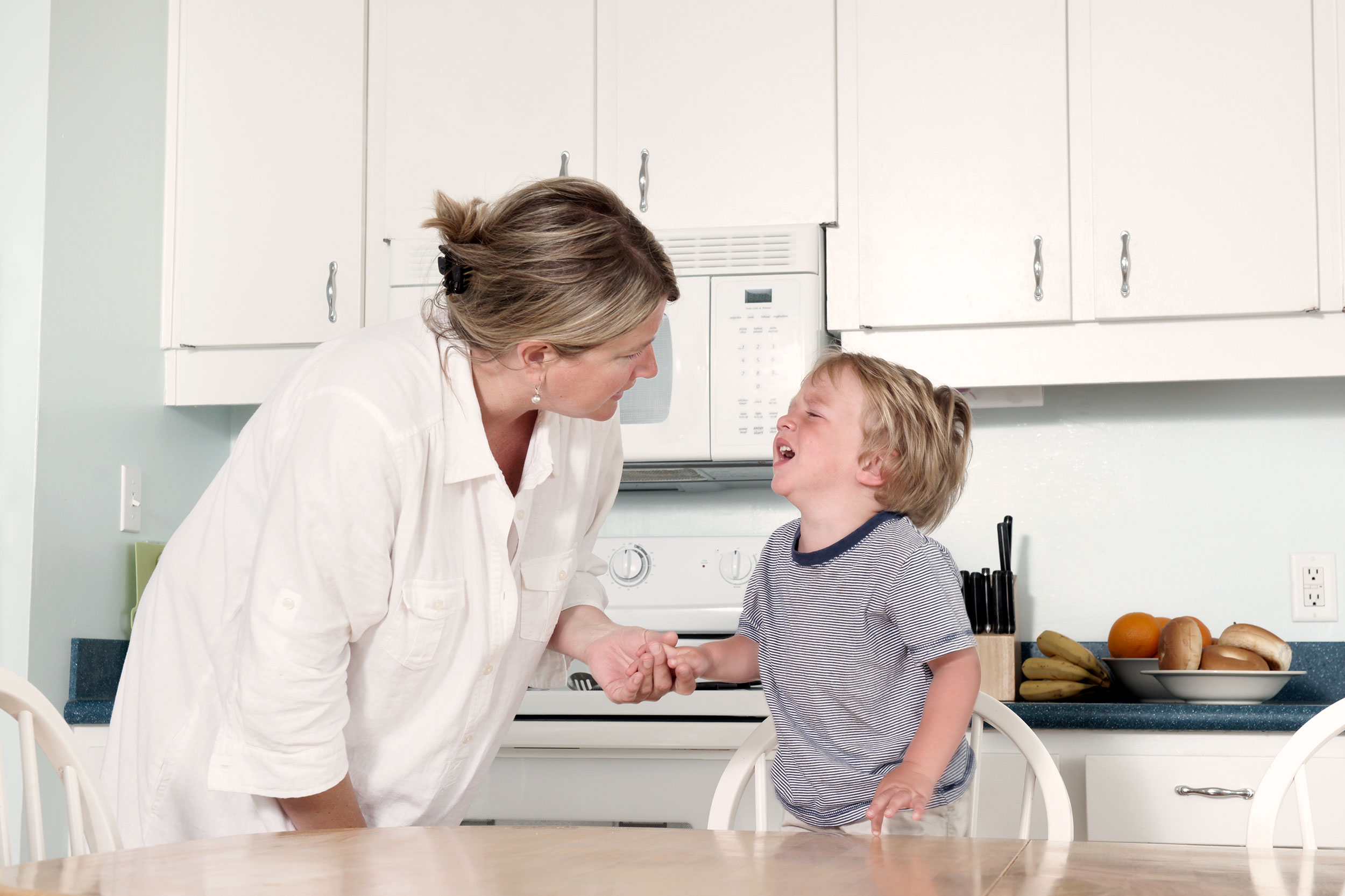
I’m awake earlier than usual and hiding out in bed for a few precious minutes of reading time when a wail interrupts me mid-paragraph. My three-year-old opens my door and throws himself at the bed.
I reach out for a hug. “What’s the matter?”
He ignores me and screams louder.
“Why are you so sad?”
He screams louder and swipes at me.
“Well, I don’t want to spend time with someone who is screaming at me.” I get up and walk into my bathroom.
He follows, screams echoing off the tiles.
But I should really know better than to ask why my son is sad, because the book he just interrupted—Adele Faber and Elaine Mazlish’s timeless “How to Talk So Kids Will Listen & Listen So Kids Will Talk”—warned me off asking why when dealing with an upset child.
Kids’ feelings are real feelings
In the foundational chapter of their book, originally published in 1980 and more recently in a 30th Anniversary Edition, Faber and Mazlish demonstrate the many ways in which parents minimize or reject their children’s feelings: A child complains about being hot, and a parent responds by telling the kid to put on a winter jacket. A child whimpers about a paper cut, and the parent dismisses it as no big deal.
For Faber and Mazlish, these brushed-off feelings are an early breach of trust between parents and their children. The bedrock of Faber and Mazlish’s approach to parenting is acknowledging children’s feelings. Not dismissing. Not minimizing. Not jumping to explain, or blame, or problem-solve. Just acknowledging.
Faber and Mazlish offer four ways that parents can acknowledge their children’s feelings. Parents can simply look at their children and listen. They can offer short acknowledgments like “I see” or “Uh-huh.” They can identify feelings. Or they can give their children their “wishes in fantasy,” like “Wouldn’t it be amazing if we could wear shorts in the winter?” or “I wish we could built a paper cut healing machine!”
Kids may not understand their feelings
Faber and Mazlish add a special caution against “why.” Although some kids can explain their feelings in the moment, many cannot. For those kids, asking why just makes things worse. In addition to their original distress, they must now analyze the cause and come up with a reasonable explanation. Often children don’t know why they feel as they do. At other times, they’re reluctant to tell you because they fear that, in the adult’s eyes, their reason won’t seem good enough (e.g., “For that you’re crying?”).
What kids need, Faber and Mazlish argue, is for their feelings to be understood and respected, not questioned.
Imagine you get a call from someone you’ve known a long time, maybe a sibling or a dear friend. Just their tone of voice leads you to say things like, “You sound tired,” or “Oh no, you must not be feeling well,” or “You sound like you’re having a great day.”
But when talking to your child, who is in the room with you and offering plenty of clues as to how he’s feeling, you ask, “What’s the matter?” or “Why are you crying?” Even though we are trying to communicate empathy, these phrases make it seem as though we’re not really hearing our children.
Did I need to know why my son was sad in order to understand his feelings? I knew he was sad, but I didn’t acknowledge his feeling. Instead, I reflexively swooped in to solve the crying with whatever explanation fit his situation this time.
Maybe my son was crying because he was woken by the neighbors. Maybe he was crying because he’d had that nightmare with the turkey. Maybe he was crying because he was too hot or too cold. Maybe he was crying because that’s what kids do lots of the time. In reaching out for him, I was clearly trying to comfort. But did my “why” add to that? Did it matter why he was crying, or that he was seeking comfort from me?
“Why” sounds like an accusation
Once I started listening to myself, I realized that I often ask some version of “why?” in response to almost all of my child’s emotional outbursts. What’s the matter? Why are you crying? Why do you feel sad? Why are you laughing?
In our worst moments, “why” can become a parent’s accusation. Why didn’t you tell me you needed help with your homework? Why did you break all your pencils? Why didn’t you remember to take the dog out? Why did you do that to your little sister?
These kinds of why questions, Faber and Mazlish argue, put children in an impossible position. They either identify as inadequate or start getting defensive, placing blame on others. Neither position helps children solve their problems.
Turning off “why”
After reading Faber and Mazlish’s suggestion to avoid asking why, I resolve to start acknowledging my son’s feelings. My next chance comes later that morning when he runs into the kitchen and yells, “It’s raining!” before collapsing into sobs.
“Why are you sad it’s –” I catch myself and switch course. “You’re sad it’s raining.”
“Yes.”
“Sometimes the noise of rain can be scary.”
“Yes.”
My son dives in for a hug and asks if we can read a book. I pick Mo Willems’ “Are You Ready to Play Outside”, which seems appropriate given my son’s mood about the weather.
Turning “why” on ourselves
Faber and Mazlish make a compelling case for not asking “why” when our kids are wrestling with negative emotions. Although their focus is on children, their book also suggests even more important “why” questions:
Why are parents so quick to dismiss or minimize their children’s feelings? Why are we made so angry or uncomfortable by our children’s displays of negative emotion?
It’s incredibly difficult to consider the reasoning behind our own parenting decisions. People spend years in therapy answering that question. But it’s likely true that many of us are wound up in our hopes and dreams for our children. We want them to be happy, fulfilled, and successful. Their negative emotions seem like evidence that they are not thriving.
If we don’t want our children to crumple at the slightest provocation, to in fact flourish despite the difficult times, we need to help them identify and address their emotions.
This blog was written for Parent Co. via blogger Stephanie Loomis Pappas. Read more of her work on her website, snackdinner.
If want to build a deeply meaningful relationship full of trust and intimacy, then subscribe below to receive our blog posts directly to your inbox:

